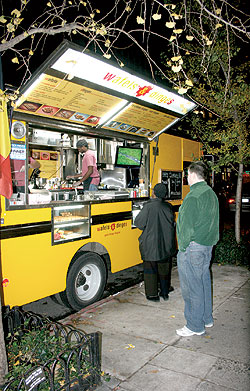
A Wafels & Dinges food truckMany equate New York food trucks with hot dog carts or greasy spoons. But a glut of new retail food trucks, from Schnitzel and Things (which can be spotted in Midtown during the weekday lunch rush) to dessert purveyor Street Sweets, have added to longtime stalwarts like the bright orange Mud Truck (which started in the East Village and has served up brew since March 2001). And in this economy, many say real estate on wheels is an appealing alternative to more expensive brick-and-mortar retail spaces, especially for new businesses.
Food truck operators say there are several benefits to their business model, including reduced costs, the ability to test out the market, and the flexibility of being able to try different locations.
Street Sweets, which sells European-inspired treats, is just one of the latest trucks on the road.
“We didn’t have $3 million or $5 million to start a restaurant,” explained Grant DiMille, one half of the Street Sweets team.
DiMille and his wife and business partner, Samira Mahboubian, ditched their corporate careers a little over a year ago and opened the truck in June.
Since then, Street Sweets has perused Manhattan and Brooklyn. “We’re not naïve to where the foot traffic is,” DiMille said, noting that the truck moves if it’s not getting customers.
On the night that The Real Deal spoke to DiMille, Street Sweets was operating alongside a dumpling truck — adjacent to high-end foodery Citarella on the Upper West Side.
Like other food trucks, including the Big Gay Ice Cream Truck, which also opened this summer, Street Sweets uses Twitter to tell customers where it’ll be.
DiMille said with a traditional retail space, “If I pick a location and it isn’t great, I’m stuck to that brick and mortar.”
Owners, who must obtain permits from the city’s Health Department and undergo regular inspections, say real estate on wheels offers a safe half-step before restaurant ownership — especially in an uncertain market.
Thomas DeGeest, the founder of two-year-old Wafels & Dinges, another popular rolling food vendor, said opening a restaurant was too big a move for him. The truck specializes in traditional Belgian waffles (complete with toppings, or “dinges”).
“I didn’t know how it would work in New York,” he said. “I wanted to test the market.”
His total investment for the project — $60,000 for the truck and $40,000 to cover other expenses, including company branding — is relatively thrifty compared to the average restaurant investment.
While his business has been a success — Wafels & Dinges took home this year’s Street Vendor Project award for best dessert truck — DeGeest said he’d rather wait longer before setting up a permanent shop.
“There’s a lot to think about when opening a restaurant; there’s a lot of money on the line,” he noted.